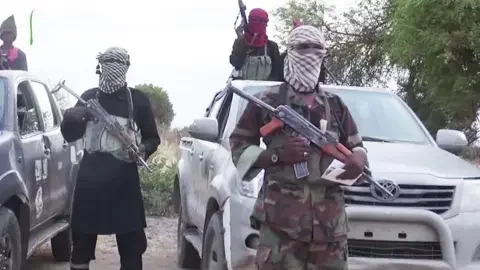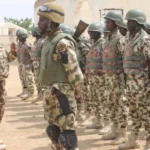A former Chief of Defence Staff, General Lucky Irabor (retd.), has revealed that no fewer than 2,700 officers and soldiers were killed over 12 years in the battle against Boko Haram.
He also denied the insinuation that officers and soldiers of a particular faith were mostly deployed to battlegrounds and were, therefore, disproportionately killed during the many fights against the members of the dreaded group.
Irabor made these revelations in his new book, “SCARS: Nigeria’s Journey and the Boko Haram Conundrum,” which was presented to the public a few days ago.
The retired general played critical national and international military intervention roles, including peacekeeping efforts in Liberia and Sierra Leone with the ECOWAS Monitoring Group (ECOMOG), the United Nations Mission in Sierra Leone, and the United Nations Mission in Liberia.
Irabor said his book attempts to chronicle “the diverse impact of Boko Haram on the Nigerian State” and that “it is a catalogue of facts on Boko Haram, gleaned from my first-hand experience during my military command of the North-East Region of Nigeria.”
The former defence chief said one of the most striking measures of the cost of war is the human toll. According to him, “The human cost of the Boko Haram crisis is vast and can be equated to a pandemic.”
Available data indicate that very high figures of deaths have been recorded since 2009 as a result of the direct impact of violence from Boko Haram and other terrorist groups.
In the military, no fewer than 2,700 officers and soldiers paid the supreme price in the defence of Nigeria between 2009 and 2021.
Irabor quoted a UNDP report which stated that as of 2020, the conflict may have resulted in nearly 350,000 deaths, with about 314,000 of those from indirect causes.
He denied the claim in some quarters that only military personnel from certain ethnic groups or religious faiths were sent to the North-East to confront terrorists. As such, more personnel from such groups and religions were said to have been lost in the war.
“This is not true,” he said, adding that, “a visit to military cemeteries shows that almost an equal number of casualties can be seen from the marked graves.”
Given the difference in burial procedures, there are two divisions in a military cemetery: one for Christians and the other for Muslims. Therefore, suggesting that either Muslims or some people from certain ethnic groups are not involved in the war effort, nor have suffered casualties, is blatantly false.
Irabor, therefore, declared that the deaths that resulted from the activities of Boko Haram remain an eternal scar, which he said should be a national lesson for building a virile nationhood.
Irabor alleged that some reports by individuals and non-governmental organisations affected the morale of officers and also misled the United States of America into sanctioning some officers solely because they held critical appointments during the war.
He said that while it may not have been the intention of US authorities to undermine the operational objectives of the war efforts, the outcome was profoundly devastating and could hardly have been rationalised.
Interestingly, he said, the affected officers were not found to have committed any known offence. He cited the cases of Major General L.P. Ngubane and Brigadier General R.O. Bamigboye as examples.
The general recalled that during the early days of Boko Haram, Amnesty International reported that troops of the Nigerian Army committed mass killings of civilians during operations.
Irabor stated that General Ngubane was the chief training and operations officer at Defence Headquarters during the early days of operations against Boko Haram in the North-East, adding that even though the Federal Government’s committee report pointed out that no such thing happened and that there was no mass grave as reported by Amnesty International, the US ignored such a report.
He said, “At the time, Major General LP Ngubane had taken his wife, who was being treated for cancer, to the USA on medical evacuation. The senior officer had to return to Nigeria to address personal, administrative, and logistics issues related to his wife’s treatment. Painfully, he could not return to the USA to join in giving care and support to his sick wife because the US authorities refused to renew his visa until her death.”
On Brigadier General Bamigboye, who was the commander of the 21 Armoured Brigade in Maiduguri, he said the officer’s family had been living in the USA, where his wife worked and raised their children.
“He was equally denied a visa to travel to visit his family, even after retiring from the Nigerian Army to date,” General Irabor wrote.
The former CDS also analysed the security crises in some zones, such as the North-West, North-Central, South-East, South-South, and South-West, and gave tips on how to curtail the activities of terrorists in these zones.
For the North-West, he said that the “abysmal literacy level, unskilled labour force, ungoverned spaces, high poverty rate, expanse of porous borders and intense competition over land and water between predominantly Fulani herders and mostly Hausa farmers have catalysed banditry and insurgency.”
He further remarked that the insurgency in the North-West had also attracted some jihadist groups to the region, such as Boko Haram splinter factions and Islamic affiliates, including Lakurawa terrorists.
Irabor observed that the insurgency in the zone had spilled into the North-Central region, forcing herders southward into the Middle Belt, thereby aggravating herder–farmer disputes.
The former CDS reported that the competition for resources fuelled violent clashes between Fulani herders and settled farmers, displacing communities and claiming numerous lives in the North-Central zone.
He also said that violent agitations by the Indigenous People of Biafra (IPOB) and its military wing, the Eastern Security Network (ESN), had transformed into terrorism, drawing inspiration from Boko Haram tactics.
According to him, the use of force and elements of terror that characterised Boko Haram increasingly became the hallmarks of IPOB/ESN activities. As a result, the seasonal homecoming of people of South-East origin and visitors alike during significant festive periods, such as Christmas/New Year and Easter celebrations, has been severely affected due to security and safety concerns.
The former CDS also linked the agitation of some Yoruba Nation proponents to the sprawling effects of Boko Haram from the northern part of the country.
“In their view, the violence and general state of insecurity in many parts of the country can be contained under independent self-rule,” he wrote.
Concerning the South-South, he said the people of the region hold the belief that the insurgency and banditry in both the North-East and North-West are intended to protect illegal mining, thereby preventing the federal government from gaining revenue from rich endowments in those zones. Yet the oil and gas deposits within the South-South or the Niger Delta are exploited to fund the Federal Government, with a greater share going to the North-West and the North-East.
“Niger Delta stakeholders, therefore, see some level of economic injustice as they cannot comprehend the basis for such a dichotomy. This is a view that has gained acceptance within the zone,” he added.




